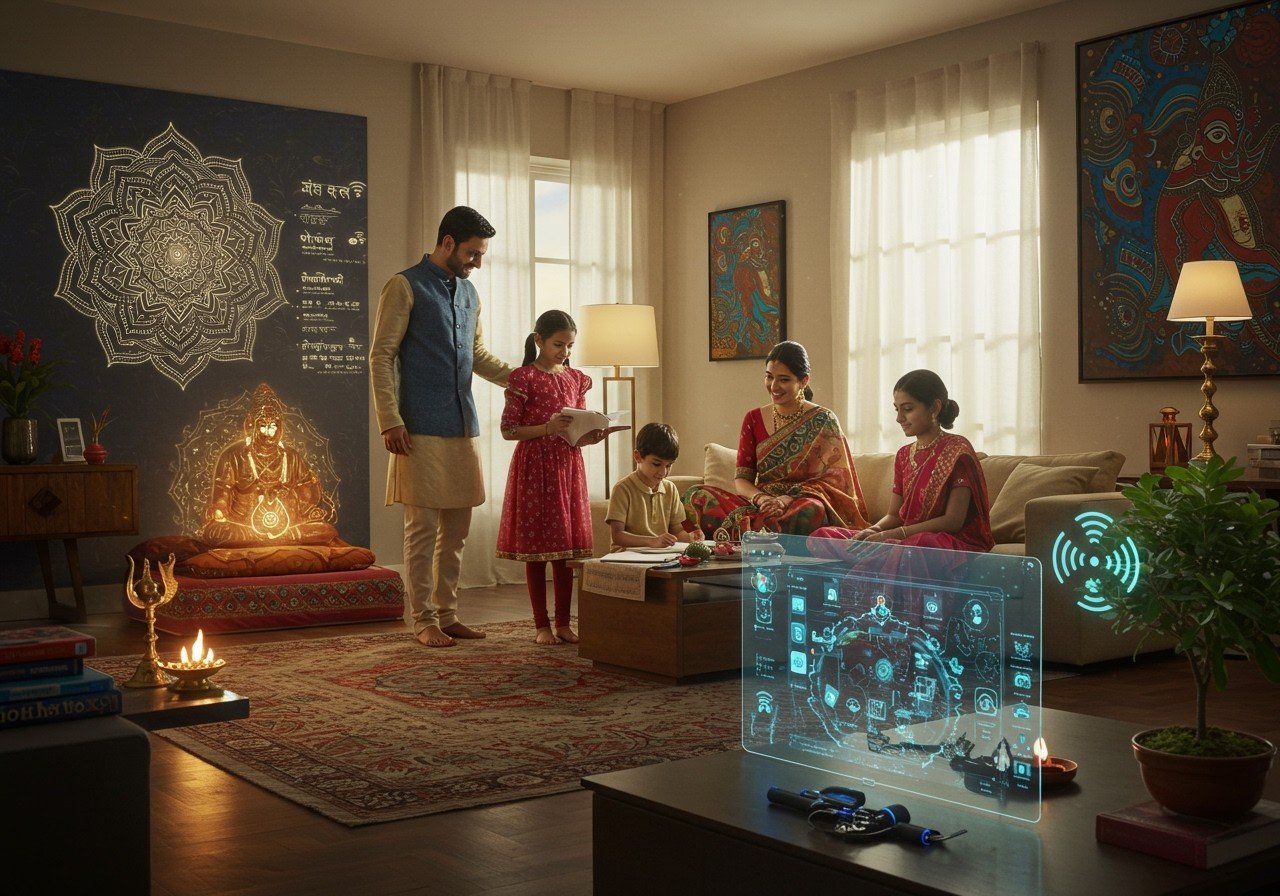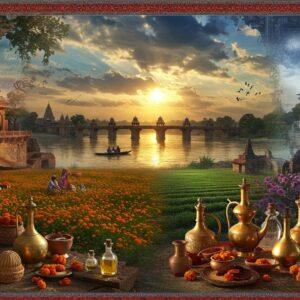Grhastha Ashrama in 2025: Balancing Tradition and Modernity

In today’s dynamic world, the Grhastha Ashrama, the second stage of Hindu life centered around family and societal duties, remains a cornerstone of tradition. It emphasizes the importance of household responsibilities, balancing family life with societal contributions. As we navigate 2025 with its modern conveniences, like online shopping for ritual items, understanding the Grhastha Ashrama allows us to honor our heritage while embracing contemporary life. Discover how to maintain a harmonious balance between work, family, and spiritual practices within the context of modern Hindu family life.
Understanding the Grhastha Ashrama
The Grhastha Ashrama is the second stage in the Hindu life cycle, focusing on marriage, family, and societal duties. It traditionally plays a vital role in the continuation of the family unit and contributing to society’s well-being. However, modern households face unique challenges in upholding these values amidst the pressures of demanding careers and urban living. Recognizing its historical and spiritual importance allows for a more thoughtful approach to balancing these often competing aspects of modern life. Learn more about the richness of Hindu traditions on Poojn.in.
Balancing Work and Family Life
In today’s economy, many families rely on dual incomes. This dynamic introduces its own set of complexities. Successfully balancing work and family requires conscious effort and planning. Flexible work arrangements, when possible, can significantly alleviate the strain. Sharing household responsibilities ensures that everyone contributes, fostering a sense of teamwork within the family. Establishing clear boundaries between work and family time, such as disconnecting from electronic devices during meals, safeguards precious family moments. Technology, used mindfully, can also help families stay connected. Apps designed for scheduling and communication facilitate coordination and streamline family management.
Maintaining Spiritual Practices as a Householder
Spirituality offers solace and meaning for many individuals. Integrating spiritual practices into the fabric of daily life, even amidst a busy schedule, provides a sense of grounding. Simple rituals, such as morning prayers or a few moments of meditation, can bring a sense of calm and focus to the day. Online platforms provide a wealth of resources for spiritual development. Virtual satsangs and online classes offer connection to spiritual communities and provide opportunities for growth and reflection. Elders within the family play a vital role in transmitting traditions and spiritual values to younger generations, ensuring the continuity of cultural heritage.
Modern Hindu Family Dynamics
Family roles are evolving, reflecting broader societal shifts. Many families are embracing more egalitarian relationships, moving away from traditional hierarchies. Urbanization and globalization have significantly impacted these dynamics. Open communication and mutual respect are essential for maintaining harmony within the family unit. Children learn cultural values through active participation in rituals and festivals. These shared experiences strengthen family bonds and reinforce cultural identity. Explore mindful rituals to enhance your family’s spiritual life on Poojn.in.
The Role of Rituals and Traditions
Rituals serve to reinforce familial connections and provide a tangible link to cultural heritage. Adapting these rituals to accommodate modern lifestyles is possible without sacrificing their core meaning. Online platforms, like Poojn.in, simplify the process of acquiring authentic ritual items. Many families now participate in cultural ceremonies virtually, enabling connection across geographical distances. Festivals offer opportunities for shared joy and togetherness, strengthening family bonds and fostering a sense of community.
Embracing Tradition and Modernity
The Grhastha Ashrama provides valuable guidance regarding duty and devotion. In 2025, achieving a harmonious balance between these values and the demands of modern life is paramount. By thoughtfully integrating work, family, and spiritual practices, we preserve our heritage while adapting to contemporary challenges. Embracing technology enhances our capacity to maintain these connections, ensuring that cultural values endure for generations to come. Discover the wisdom of the Vedas and their relevance to modern life on Poojn.in.
How Poojn.in Supports Your Grhastha Journey
Poojn.in offers invaluable support for modern families navigating the Grhastha Ashrama. As India’s leading provider of spiritual and cultural goods, we offer a wide selection of authentic puja items and ritual materials designed to support traditional practices within today’s busy lifestyles.
Our curated collection includes:
- Light Lamps (Diyas): Crafted from traditional brass and copper, these lamps illuminate your home with a sacred ambiance, symbolizing spiritual enlightenment. Perfect for daily rituals and special occasions, they enhance the spiritual atmosphere of your home. They come in various sizes and designs to suit your specific needs and aesthetic preferences.
- Complete Puja Kits: Streamline your preparations with our pre-assembled puja kits. These comprehensive sets contain all the essential items for specific rituals, saving you valuable time while ensuring the proper observance of traditions. They are thoughtfully curated to include everything you need, from incense and diyas to offerings and sacred powders.
- Quality Ritual Items: We offer a wide range of pure copper and brass items, specifically designed for Grhastha duties and daily worship. These high-quality items enhance the authenticity and spiritual significance of your rituals. Our products are crafted with meticulous attention to detail, ensuring their durability and aesthetic appeal.
The convenience of online shopping at Poojn.in allows you to:
- Order Authentic Items: Source authentic ritual items from trusted and reputable suppliers.
- Access Information: Find detailed product information and usage guidelines to support your practices.
- Convenient Delivery: Receive your orders conveniently delivered directly to your doorstep.
- Customer Support: Access dedicated customer support for all your ritual-related inquiries.
Visit Poojn.in to explore our complete collection of traditional items designed to help you maintain the sacred balance of Grhastha life in modern times. Our products support both daily rituals and special ceremonies, simplifying the process of fulfilling your dharmic responsibilities while managing contemporary commitments. Explore our beautiful Laddu Gopal murtis for your home mandir. Enhance your puja experience with our premium sandalwood incense sticks.
Conclusion: A Harmonious Journey
In 2025, the Grhastha Ashrama continues to serve as a valuable compass, guiding us through the complexities of household life. It offers a beautiful integration of tradition and modernity, teaching us the art of balancing our duties and devotion. By embracing both our professional and familial lives, we cultivate a nurturing environment that honors our cultural heritage. Create a serene modern home mandir with our guide.
The family remains the bedrock of society, a place where values and traditions are imparted and cherished. As roles evolve and technology becomes increasingly integrated into our lives, it is essential to adapt mindfully while preserving the essence of our rituals. Through shared responsibilities, spiritual practices, and the joyous celebrations of festivals, we fortify our bonds and nurture our cultural identity. Offer a pure cotton saree in your puja, available at Poojn.in.
By thoughtfully integrating these elements, we ensure the continuity of our traditions, offering guidance and inspiration for generations to come. As we move forward, let us embrace the wisdom of the past while welcoming the future with open hearts and minds.
Modern Hindu Family Life: Adapting to Change While Preserving Values
Modern Hindu family life is evolving, balancing traditional values with contemporary changes. While core principles like respect, duty, and devotion remain, family structures and dynamics are adapting to urbanization, globalization, and shifting cultural attitudes. Discover how technology can complement your Hindu practices.
Family Structure
- Shift Towards Nuclear Families: Urbanization, career opportunities, and the desire for independence contribute to the growing prevalence of nuclear families (parents and children). This transition often requires adjustments in family support systems and resource management.
- Joint Family Influence: Despite the rise in nuclear families, the values and legacy of joint families continue to exert influence on relationships and social structures. Respect for elders and the emphasis on collective well-being remain deeply embedded in Hindu culture.
- Joint Family Structure: Traditional joint families, where multiple generations reside together, sharing resources and responsibilities, are less common. However, they still exist and often involve complex dynamics, especially in decision-making and resource allocation. The senior male, traditionally the Karta, typically heads the family.
Values and Traditions
- Respect for Elders: Reverence for elders remains a cornerstone of Hindu family life. They are seen as sources of wisdom and experience. Their counsel is often sought on important family matters, upholding a tradition of intergenerational knowledge transfer.
- Care for Aging Parents: Caring for elderly parents is considered a moral imperative, ensuring family harmony and societal well-being. This responsibility often involves balancing personal and professional commitments. It emphasizes the value of reciprocal care and support within the family.
- Passing on Religious Beliefs: Families play a crucial role in transmitting Hindu beliefs and practices to children, encompassing moral values, prayers, and participation in ceremonies. This transmission ensures the continuity of cultural heritage and strengthens family identity. It provides children with a framework for understanding their place in the world.
- Duty (Dharma): Hindu teachings emphasize duty towards family and society. Fulfilling one’s dharma is seen as essential for spiritual and personal growth. This concept promotes responsible citizenship and emphasizes the interconnectedness of individuals and community.
Changing Dynamics
- Urbanization and Migration: Movement to urban areas for education and employment can create distance between family members. This can lead to less frequent interactions and require new ways of maintaining connections. Technology plays a crucial role in bridging these geographical gaps.
- Globalization: Exposure to global values, especially individualism and personal freedom, influences younger generations. This can sometimes create tension between tradition and individual aspirations. It also encourages dialogue about the evolving meaning of family.
- Economic Factors: The rising cost of living and the need for dual-income households can make it challenging to support multiple generations under one roof. This has contributed to the shift towards nuclear families. Economic considerations also influence decisions related to education, healthcare, and eldercare.
- Changing Gender Roles: Women’s increasing empowerment and access to education and career opportunities redefine family dynamics. This empowers women to contribute both financially and emotionally to their families. It also challenges traditional notions of gender roles within the household.


